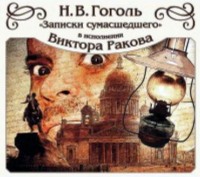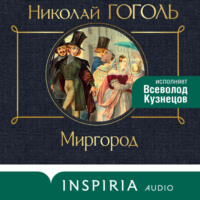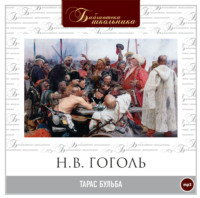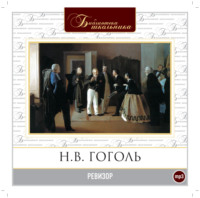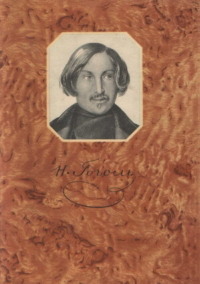 полная версия
полная версияTaras Bulba, and Other Tales
“Very well, then, just a little cup,” said Ivan Ivanovitch, and reached out his hand to the tray. Heavens! What a height of refinement there was in that man! It is impossible to describe what a pleasant impression such manners produce!
“Will you not have another cup?”
“I thank you sincerely,” answered Ivan Ivanovitch, turning his cup upside down upon the tray and bowing.
“Do me the favour, Ivan Ivanovitch.”
“I cannot; much obliged.” Thereupon Ivan Ivanovitch bowed and sat down.
“Ivan Ivanovitch, for the sake of our friendship, just one little cup!”
“No: I am extremely indebted for your hospitality.” So saying, Ivan Ivanovitch bowed and seated himself.
“Only a cup, one little cup!”
Ivan Ivanovitch put his hand out to the tray and took a cup. Oh, the deuce! How can a man contrive to support his dignity!
“Demyan Demyanovitch,” said Ivan Ivanovitch, swallowing the last drain, “I have pressing business with you; I want to enter a complaint.”
Then Ivan Ivanovitch set down his cup, and drew from his pocket a sheet of stamped paper, written over. “A complaint against my enemy, my declared enemy.”
“And who is that?”
“Ivan Nikiforovitch Dovgotchkun.”
At these words, the judge nearly fell off his chair. “What do you say?” he exclaimed, clasping his hands; “Ivan Ivanovitch, is this you?”
“You see yourself that it is I.”
“The Lord and all the saints be with you! What! You! Ivan Ivanovitch! you have fallen out with Ivan Nikiforovitch! Is it your mouth which says that? Repeat it! Is not some one hid behind you who is speaking instead of you?”
“What is there incredible about it? I can’t endure the sight of him: he has done me a deadly injury—he has insulted my honour.”
“Holy Trinity! How am I to believe my mother now? Why, every day, when I quarrel with my sister, the old woman says, ‘Children, you live together like dogs. If you would only take pattern by Ivan Ivanovitch and Ivan Nikiforovitch, they are friends indeed! such friends! such worthy people!’ There you are with your friend! Tell me what this is about. How is it?”
“It is a delicate business, Demyan Demyanovitch; it is impossible to relate it in words: be pleased rather to read my plaint. Here, take it by this side; it is more convenient.”
“Read it, Taras Tikhonovitch,” said the judge, turning to the secretary.
Taras Tikhonovitch took the plaint; and blowing his nose, as all district judges’ secretaries blow their noses, with the assistance of two fingers, he began to read:—
“From the nobleman and landed proprietor of the Mirgorod District, Ivan Pererepenko, son of Ivan, a plaint: concerning which the following points are to be noted:—
“1. Ivan Dovgotchkun, son of Nikifor, nobleman, known to all the world for his godless acts, which inspire disgust, and in lawlessness exceed all bounds, on the seventh day of July of this year 1810, inflicted upon me a deadly insult, touching my personal honour, and likewise tending to the humiliation and confusion of my rank and family. The said nobleman, of repulsive aspect, has also a pugnacious disposition, and is full to overflowing with blasphemy and quarrelsome words.”
Here the reader paused for an instant to blow his nose again; but the judge folded his hands in approbation and murmured to himself, “What a ready pen! Lord! how this man does write!”
Ivan Ivanovitch requested that the reading might proceed, and Taras Tikhonovitch went on:—
“The said Ivan Dovgotchkun, son of Nikifor, when I went to him with a friendly proposition, called me publicly by an epithet insulting and injurious to my honour, namely, a goose, whereas it is known to the whole district of Mirgorod, that I never was named after that disgusting creature, and have no intention of ever being named after it. The proof of my noble extraction is that, in the baptismal register to be found in the Church of the Three Bishops, the day of my birth, and likewise the fact of my baptism, are inscribed. But a goose, as is well known to every one who has any knowledge of science, cannot be inscribed in the baptismal register; for a goose is not a man but a fowl; which, likewise, is sufficiently well known even to persons who have not been to college. But the said evil-minded nobleman, being privy to all these facts, affronted me with the aforesaid foul word, for no other purpose than to offer a deadly insult to my rank and station.
“2. And the same impolite and indecent nobleman, moreover, attempted injury to my property, inherited by me from my father, a member of the clerical profession, Ivan Pererepenko, son of Onisieff, of blessed memory, inasmuch that he, contrary to all law, transported directly opposite my porch a goose-shed, which was done with no other intention that to emphasise the insult offered me; for the said shed had, up to that time, stood in a very suitable situation, and was still sufficiently strong. But the loathsome intention of the aforesaid nobleman consisted simply in this: viz., in making me a witness of unpleasant occurrences; for it is well known that no man goes into a shed, much less into a goose-shed, for polite purposes. In the execution of his lawless deed, the two front posts trespassed on my land, received by me during the lifetime of my father, Ivan Pererepenko, son of Onisieff, of blessed memory, beginning at the granary, thence in a straight line to the spot where the women wash the pots.
“3. The above-described nobleman, whose very name and surname inspire thorough disgust, cherishes in his mind a malicious design to burn me in my own house. Which the infallible signs, hereinafter mentioned, fully demonstrate; in the first place, the said wicked nobleman has begun to emerge frequently from his apartments, which he never did formerly on account of his laziness and the disgusting corpulence of his body; in the second place, in his servants’ apartments, adjoining the fence, surrounding my own land, received by me from my father of blessed memory, Ivan Pererepenko, son of Onisieff, a light burns every day, and for a remarkably long period of time, which is also a clear proof of the fact. For hitherto, owing to his repulsive niggardliness, not only the tallow-candle but also the grease-lamp has been extinguished.
“And therefore I pray that the said nobleman, Ivan Dovgotchkun, son of Nikifor, being plainly guilty of incendiarism, of insult to my rank, name, and family, and of illegal appropriation of my property, and, worse than all else, of malicious and deliberate addition to my surname, of the nickname of goose, be condemned by the court, to fine, satisfaction, costs, and damages, and, being chained, be removed to the town jail, and that judgment be rendered upon this, my plaint, immediately and without delay.
“Written and composed by Ivan Pererepenko, son of Ivan, nobleman, and landed proprietor of Mirgorod.”
After the reading of the plaint was concluded, the judge approached Ivanovitch, took him by the button, and began to talk to him after this fashion: “What are you doing, Ivan Ivanovitch? Fear God! throw away that plaint, let it go! may Satan carry it off! Better take Ivan Nikiforovitch by the hand and kiss him, buy some Santurinski or Nikopolski liquor, make a punch, and call me in. We will drink it up together and forget all unpleasantness.”
“No, Demyan Demyanovitch! it’s not that sort of an affair,” said Ivan Ivanovitch, with the dignity which always became him so well; “it is not an affair which can be arranged by a friendly agreement. Farewell! Good-day to you, too, gentlemen,” he continued with the same dignity, turning to them all. “I hope that my plaint will lead to proper action being taken;” and out he went, leaving all present in a state of stupefaction.
The judge sat down without uttering a word; the secretary took a pinch of snuff; the clerks upset some broken fragments of bottles which served for inkstands; and the judge himself, in absence of mind, spread out a puddle of ink upon the table with his finger.
“What do you say to this, Dorofei Trofimovitch?” said the judge, turning to the assistant after a pause.
“I’ve nothing to say,” replied the clerk.
“What things do happen!” continued the judge. He had not finished saying this before the door creaked and the front half of Ivan Nikiforovitch presented itself in the court-room; the rest of him remaining in the ante-room. The appearance of Ivan Nikiforovitch, and in court too, seemed so extraordinary that the judge screamed; the secretary stopped reading; one clerk, in his frieze imitation of a dress-coat, took his pen in his lips; and the other swallowed a fly. Even the constable on duty and the watchman, a discharged soldier who up to that moment had stood by the door scratching about his dirty tunic, with chevrons on its arm, dropped his jaw and trod on some one’s foot.
“What chance brings you here? How is your health, Ivan Nikiforovitch?”
But Ivan Nikiforovitch was neither dead nor alive; for he was stuck fast in the door, and could not take a step either forwards or backwards. In vain did the judge shout into the ante-room that some one there should push Ivan Nikiforovitch forward into the court-room. In the ante-room there was only one old woman with a petition, who, in spite of all the efforts of her bony hands, could accomplish nothing. Then one of the clerks, with thick lips, a thick nose, eyes which looked askance and intoxicated, broad shoulders, and ragged elbows, approached the front half of Ivan Nikiforovitch, crossed his hands for him as though he had been a child, and winked at the old soldier, who braced his knee against Ivan Nikiforovitch’s belly, so, in spite of the latter’s piteous moans, he was squeezed out into the ante-room. Then they pulled the bolts, and opened the other half of the door. Meanwhile the clerk and his assistant, breathing hard with their friendly exertions, exhaled such a strong odour that the court-room seemed temporarily turned into a drinking-room.
“Are you hurt, Ivan Nikiforovitch? I will tell my mother to send you a decoction of brandy, with which you need but to rub your back and stomach and all your pains will disappear.”
But Ivan Nikiforovitch dropped into a chair, and could utter no word beyond prolonged oh’s. Finally, in a faint and barely audible voice from fatigue, he exclaimed, “Wouldn’t you like some?” and drawing his snuff-box from his pocket, added, “Help yourself, if you please.”
“Very glad to see you,” replied the judge; “but I cannot conceive what made you put yourself to so much trouble, and favour us with so unexpected an honour.”
“A plaint!” Ivan Nikiforovitch managed to ejaculate.
“A plaint? What plaint?”
“A complaint…” here his asthma entailed a prolonged pause—“Oh! a complaint against that rascal—Ivan Ivanovitch Pererepenko!”
“And you too! Such particular friends! A complaint against such a benevolent man?”
“He’s Satan himself!” ejaculated Ivan Nikiforovitch abruptly.
The judge crossed himself.
“Take my plaint, and read it.”
“There is nothing to be done. Read it, Taras Tikhonovitch,” said the judge, turning to the secretary with an expression of displeasure, which caused his nose to sniff at his upper lip, which generally occurred only as a sign of great enjoyment. This independence on the part of his nose caused the judge still greater vexation. He pulled out his handkerchief, and rubbed off all the snuff from his upper lip in order to punish it for its daring.
The secretary, having gone through the usual performance, which he always indulged in before he began to read, that is to say, blowing his nose without the aid of a pocket-handkerchief, began in his ordinary voice, in the following manner:—
“Ivan Dovgotchkun, son of Nikifor, nobleman of the Mirgorod District, presents a plaint, and begs to call attention to the following points:—
“1. Through his hateful malice and plainly manifested ill-will, the person calling himself a nobleman, Ivan Pererepenko, son of Ivan, perpetrates against me every manner of injury, damage, and like spiteful deeds, which inspire me with terror. Yesterday afternoon, like a brigand and thief, with axes, saws, chisels, and various locksmith’s tools, he came by night into my yard and into my own goose-shed located within it, and with his own hand, and in outrageous manner, destroyed it; for which very illegal and burglarious deed on my side I gave no manner of cause.
“2. The same nobleman Pererepenko has designs upon my life; and on the 7th of last month, cherishing this design in secret, he came to me, and began, in a friendly and insidious manner, to ask of me a gun which was in my chamber, and offered me for it, with the miserliness peculiar to him, many worthless objects, such as a brown sow and two sacks of oats. Divining at that time his criminal intentions, I endeavoured in every way to dissuade him from it: but the said rascal and scoundrel, Ivan Pererepenko, son of Ivan, abused me like a muzhik, and since that time has cherished against me an irreconcilable enmity. His sister was well known to every one as a loose character, and went off with a regiment of chasseurs which was stationed at Mirgorod five years ago; but she inscribed her husband as a peasant. His father and mother too were not law-abiding people, and both were inconceivable drunkards. The afore-mentioned nobleman and robber, Pererepenko, in his beastly and blameworthy actions, goes beyond all his family, and under the guise of piety does the most immoral things. He does not observe the fasts; for on the eve of St. Philip’s this atheist bought a sheep, and next day ordered his mistress, Gapka, to kill it, alleging that he needed tallow for lamps and candles at once.
“Therefore I pray that the said nobleman, a manifest robber, church-thief, and rascal, convicted of plundering and stealing, may be put in irons, and confined in the jail or the government prison, and there, under supervision, deprived of his rank and nobility, well flogged, and banished to forced labour in Siberia, and that he may be commanded to pay damages and costs, and that judgment may be rendered on this my petition.
“To this plaint, Ivan Dovgotchkun, son of Nikifor, noble of the Mirgorod district, has set his hand.”
As soon as the secretary had finished reading, Ivan Nikiforovitch seized his hat and bowed, with the intention of departing.
“Where are you going, Ivan Nikiforovitch?” the judge called after him. “Sit down a little while. Have some tea. Orishko, why are you standing there, you stupid girl, winking at the clerks? Go, bring tea.”
But Ivan Nikiforovitch, in terror at having got so far from home, and at having undergone such a fearful quarantine, made haste to crawl through the door, saying, “Don’t trouble yourself. It is with pleasure that I—” and closed it after him, leaving all present stupefied.
There was nothing to be done. Both plaints were entered; and the affair promised to assume a sufficiently serious aspect when an unforeseen occurrence lent an added interest to it. As the judge was leaving the court in company with the clerk and secretary, and the employees were thrusting into sacks the fowls, eggs, loaves, pies, cracknels, and other odds and ends brought by the plaintiffs—just at that moment a brown sow rushed into the room and snatched, to the amazement of the spectators, neither a pie nor a crust of bread but Ivan Nikiforovitch’s plaint, which lay at the end of the table with its leaves hanging over. Having seized the document, mistress sow ran off so briskly that not one of the clerks or officials could catch her, in spite of the rulers and ink-bottles they hurled after her.
This extraordinary occurrence produced a terrible muddle, for there had not even been a copy taken of the plaint. The judge, that is to say, his secretary and the assistant debated for a long time upon such an unheard-of affair. Finally it was decided to write a report of the matter to the governor, as the investigation of the matter pertained more to the department of the city police. Report No. 389 was despatched to him that same day; and also upon that day there came to light a sufficiently curious explanation, which the reader may learn from the following chapter.
CHAPTER V
IN WHICH ARE DETAILED THE DELIBERATIONS OF TWO IMPORTANT PERSONAGES OF MIRGOROD
As soon as Ivan Ivanovitch had arranged his domestic affairs and stepped out upon the balcony, according to his custom, to lie down, he saw, to his indescribable amazement, something red at the gate. This was the red facings of the chief of police’s coat, which were polished equally with his collar, and resembled varnished leather on the edges.
Ivan Ivanovitch thought to himself, “It’s not bad that Peter Feodorovitch has come to talk it over with me.” But he was very much surprised to see that the chief was walking remarkably fast and flourishing his hands, which was very rarely the case with him. There were eight buttons on the chief of police’s uniform: the ninth, torn off in some manner during the procession at the consecration of the church two years before, the police had not been able to find up to this time: although the chief, on the occasion of the daily reports made to him by the sergeants, always asked, “Has that button been found?” These eight buttons were strewn about him as women sow beans—one to the right and one to the left. His left foot had been struck by a ball in the last campaign, and so he limped and threw it out so far to one side as to almost counteract the efforts of the right foot. The more briskly the chief of police worked his walking apparatus the less progress he made in advance. So while he was getting to the balcony, Ivan Ivanovitch had plenty of time to lose himself in surmises as to why the chief was flourishing his hands so vigorously. This interested him the more, as the matter seemed one of unusual importance; for the chief had on a new dagger.
“Good morning, Peter Feodorovitch!” cried Ivan Ivanovitch, who was, as has already been stated, exceedingly curious, and could not restrain his impatience as the chief of police began to ascend to the balcony, yet never raised his eyes, and kept grumbling at his foot, which could not be persuaded to mount the step at the first attempt.
“I wish my good friend and benefactor, Ivan Ivanovitch, a good-day,” replied the chief.
“Pray sit down. I see that you are weary, as your lame foot hinders—”
“My foot!” screamed the chief, bestowing upon Ivan Ivanovitch a glance such as a giant might cast upon a pigmy, a pedant upon a dancing-master: and he stretched out his foot and stamped upon the floor with it. This boldness cost him dear; for his whole body wavered and his nose struck the railing; but the brave preserver of order, with the purpose of making light of it, righted himself immediately, and began to feel in his pocket as if to get his snuff-box. “I must report to you, my dear friend and benefactor, Ivan Ivanovitch, that never in all my days have I made such a march. Yes, seriously. For instance, during the campaign of 1807—Ah! I will tell to you how I crawled through the enclosure to see a pretty little German.” Here the chief closed one eye and executed a diabolically sly smile.
“Where have you been to-day?” asked Ivan Ivanovitch, wishing to cut the chief short and bring him more speedily to the object of his visit. He would have very much liked to inquire what the chief meant to tell him, but his extensive knowledge of the world showed him the impropriety of such a question; and so he had to keep himself well in hand and await a solution, his heart, meanwhile, beating with unusual force.
“Ah, excuse me! I was going to tell you—where was I?” answered the chief of police. “In the first place, I report that the weather is fine to-day.”
At these last words, Ivan Ivanovitch nearly died.
“But permit me,” went on the chief. “I have come to you to-day about a very important affair.” Here the chief’s face and bearing assumed the same careworn aspect with which he had ascended to the balcony.
Ivan Ivanovitch breathed again, and shook as if in a fever, omitting not, as was his habit, to put a question. “What is the important matter? Is it important?”
“Pray judge for yourself; in the first place I venture to report to you, dear friend and benefactor, Ivan Ivanovitch, that you—I beg you to observe that, for my own part, I should have nothing to say; but the rules of government require it—that you have transgressed the rules of propriety.”
“What do you mean, Peter Feodorovitch? I don’t understand at all.”
“Pardon me, Ivan Ivanovitch! how can it be that you do not understand? Your own beast has destroyed an important government document; and you can still say, after that, that you do not understand!”
“What beast?”
“Your own brown sow, with your permission, be it said.”
“How can I be responsible? Why did the door-keeper of the court open the door?”
“But, Ivan Ivanovitch, your own brown sow. You must be responsible.”
“I am extremely obliged to you for comparing me to a sow.”
“But I did not say that, Ivan Ivanovitch! By Heaven! I did not say so! Pray judge from your own clear conscience. It is known to you without doubt, that in accordance with the views of the government, unclean animals are forbidden to roam about the town, particularly in the principal streets. Admit, now, that it is prohibited.”
“God knows what you are talking about! A mighty important business that a sow got into the street!”
“Permit me to inform you, Ivan Ivanovitch, permit me, permit me, that this is utterly inadvisable. What is to be done? The authorities command, we must obey. I don’t deny that sometimes chickens and geese run about the street, and even about the square, pray observe, chickens and geese; but only last year, I gave orders that pigs and goats were not to be admitted to the public squares, which regulations I directed to be read aloud at the time before all the people.”
“No, Peter Feodorovitch, I see nothing here except that you are doing your best to insult me.”
“But you cannot say that, my dearest friend and benefactor, that I have tried to insult you. Bethink yourself: I never said a word to you last year when you built a roof a whole foot higher than is allowed by law. On the contrary, I pretended not to have observed it. Believe me, my dearest friend, even now, I would, so to speak—but my duty—in a word, my duty demands that I should have an eye to cleanliness. Just judge for yourself, when suddenly in the principal street—”
“Fine principal streets yours are! Every woman goes there and throws down any rubbish she chooses.”
“Permit me to inform you, Ivan Ivanovitch, that it is you who are insulting me. That does sometimes happen, but, as a rule, only besides fences, sheds, or storehouses; but that a filthy sow should intrude herself in the main street, in the square, now is a matter—”
“What sort of a matter? Peter Feodorovitch! surely a sow is one of God’s creatures!”
“Agreed. Everybody knows that you are a learned man, that you are acquainted with sciences and various other subjects. I never studied the sciences: I began to learn to write in my thirteenth year. Of course you know that I was a soldier in the ranks.”
“Hm!” said Ivan Ivanovitch.
“Yes,” continued the chief of police, “in 1801 I was in the Forty-second Regiment of chasseurs, lieutenant in the fourth company. The commander of our company was, if I may be permitted to mention it, Captain Eremeeff.” Thereupon the chief of police thrust his fingers into the snuff-box which Ivan Ivanovitch was holding open, and stirred up the snuff.
Ivan Ivanovitch answered, “Hm!”
“But my duty,” went on the chief of police, “is to obey the commands of the authorities. Do you know, Ivan Ivanovitch, that a person who purloins a government document in the court-room incurs capital punishment equally with other criminals?”
“I know it; and, if you like, I can give you lessons. It is so decreed with regard to people, as if you, for instance, were to steal a document; but a sow is an animal, one of God’s creatures.”
“Certainly; but the law reads, ‘Those guilty of theft’—I beg of you to listen most attentively—‘Those guilty!’ Here is indicated neither race nor sex nor rank: of course an animal can be guilty. You may say what you please; but the animal, until the sentence is pronounced by the court, should be committed to the charge of the police as a transgressor of the law.”
“No, Peter Feodorovitch,” retorted Ivan Ivanovitch coolly, “that shall not be.”


